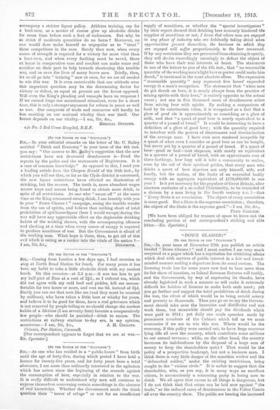[TO THE EDITOR or THE " SPECTATOR.") Strs—As one who
has resided in a " public-house" from birth until the age of forty-five, during which period I have held a licence for twenty-five years, and for forty years been a total abstainer, I am more than ordinarily interested in the agitation which has arisen since the beginning of the crusade against the consumption of beer, especially in relation to the war. It is really difficult to understand why men will continue to express themselves concerning certain somethings in the absence of real knowledge. Whether the Government made the drink, question their " tower of refuge " 'or not for an insufficient supply of munitions, or whether the " special investigators" by their report showed that drinking beer seriously hindered tre supplies of munitions or not, I know that where men are engaged in any phase of industry who are habitually taking drink when opportunities present themselves, the business in which they are engaged will suffer proportionately to the beer consumed. If by any restriction they are prevented from obtaining it openly, they will devise exceedingly cunningly to defeat the object of those who have their real interests at heart. The statement in one of the letters to you of the 4th inst., that " no reasonable quantity of the working man's light beer or porter could make him drunk," is irrational in the most absolute sgnse. The expression "reasonable quantity " may represent five hours' expended energy in a man's occupation. The statement that "when men do get drunk on beer, it is nearly always from the practice of mixing spirits with their beer," is entirely opposite to the actual cause ; not one in five thousand cases of drunkenness arises from mixing beer with spirits. By making a comparison of food by its calorimetric value, it is recognized as a fact that a glass of good ale is approximately as nourishing as a glass of milk, and that "a quart of good beer is nearly equivalent to a quarter of a pound of bread." It would be interesting to have a definition of a glass of good beer ; with the quantity required to interfere with the powers of discernment and discrimination Of the average man. I have seen men rendered incapable by a quart of what even I consider as good beer as can be bought, but never yet by a quarter of a pound of bread. If a quart of beer—good or bad—cost sixpence, with nearly an equivalent to a quarter of a pound of bread, with an approximate cost of three-farthings, how long will it take a community to realize, even by the aid of their spiritual guides, that every man who drinks a quart of beer deprives not only himself, wife, and family, but the nation, of the fruits of an expended bodily energy with an aggregate equivalent of £170,000,000 in one year ? Is it yet necessary for the populace of Great Britain, after nineteen centuries of a so-called Christianity, to be reminded of a dictum by a man living in the fourth century B.C. ?—that " Every State is an association. The object of every association is some good. But a State is the supreme association ; therefore, the object of the State is the supreme good."—I am, Sir, &e.,
FRED Ganucur.
[We have been obliged for reasons of space to leave out the concluding portion of our correspondent's striking and able letter.—En. Spectator.]










































 Previous page
Previous page